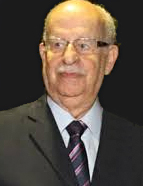

Francisco Falcon is among the Brazilian historians most dedicated to studying the history of Portugal during the Modern Period, with a focus on the Pombaline era. He graduated in History and Geography in 1955 from the Universidade Federal do Rio de Janeiro [Federal University of Rio de Janeiro] (UFRJ), then known as the University of Brazil, and completed a Museology degree at the Museu Histórico Nacional [National Historical Museum] in 1956. That same year, he became an assistant in the Modern and Contemporary History department, taught by Professor Maria Yeda Linhares, at the Faculdade Nacional de Filosofia [National Faculty of Philosophy], then part of the University of Brazil. Later, he became a professor at the Faculdade Fluminense de Filosofia [Fluminense Faculty of Philosophy], now the Universidade Federal Fluminense [Fluminense Federal University] in Niterói , where he earned his doctorate and subsequently his “livre- docência ” (similar to “ habilitation ” in the academic career path). Alongside other professors in History and Social Sciences, he helped establish the Instituto de Ciências Humanas e Filosofia [Institute of Human Sciences and Philosophy] (ICHF) after the Faculdade Nacional de Filosofia [National Faculty of Philosophy] at UFRJ was dissolved. In 1961, Falcon was among the professors from various Brazilian universities who founded the Associação Nacional de História [National History Association] (ANPUH), of which he remains a member. He has also served as an Associate Professor at the Pontifícia Universidade Católica do Rio de Janeiro [Pontifical Catholic University of Rio de Janeiro] (PUC/RJ) and continues to be an active historian, part of the permanent faculty for the Postgraduate Programme at Universidade Salgado de Oliveira [Salgado de Oliveira University] (Universo).
His ties with Portugal were enduring, not only because he completed a post-doctorate in Modern History at the Instituto de Ciências do Trabalho e da Empresa [Institute of Labour and Business Sciences] (ISCTE) in 1984, with a scholarship from Brazil's Coordination of Higher Education Personnel (CAPES), but also through his involvement with the University of Coimbra. There, he coordinated the Brazilian side of the project História da História em Portugal e no Brasil [History of History in Portugal and Brazil,] a Portuguese-Brazilian initiative funded by the Instituto de Cultura e Língua Portuguesa [Institute of Portuguese Language and Culture] (ICALP), later known as Instituto Camões [Camões Institute], and the Junta Nacional de Investigação Científica e Tecnológica [National Board for Scientific and Technological Research] (JNICT), which was succeeded by the Fundação para a Ciência e Tecnologia [Foundation for Science and Technology] (FCT), along with CAPES. Although the project was fully realised only by the Portuguese side (the História da História em Portugal: Sécs . XIX-XX, 1996 , was published, authored by Luís Reis Torgal , J. M. Amado Mendes, and Fernando Catroga , with a second edition in 1998), it fostered a steady exchange of Portuguese professors travelling to Brazil towards the end of the 20th century, while Brazilian historians visited Portugal, strengthening the academic ties between both countries.
This work is financed by national funds through FCT - Foundation for Science and Technology, I.P, in the scope of the projects UIDB/04311/2020 and UIDP/04311/2020.
